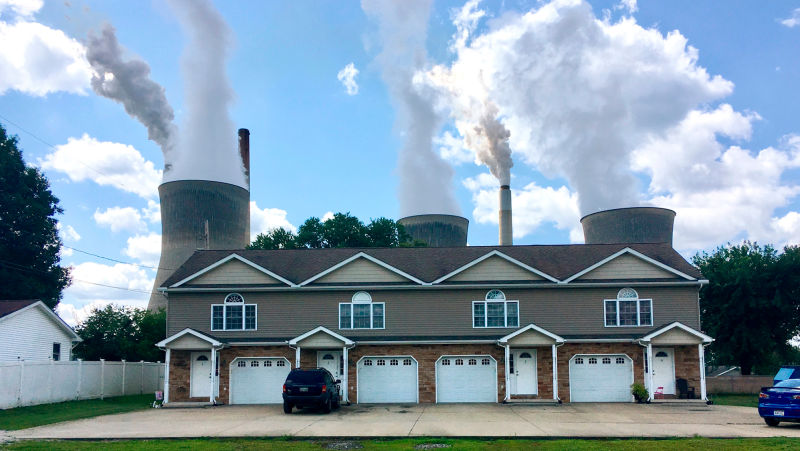
Photo: AP
The Environmental Protection Agency is using energy affordability among low-income communities and people of color as an argument to bring back coal. Yes, the same coal responsible for an estimated 3,000 American deaths a year.
Acting Administrator Andrew Wheeler announced a new proposal Thursday that would repeal Obama-era regulations aimed at reducing carbon dioxide emissions from coal-fired power plants. The EPA is doing so under the guise of advancing “clean coal,” a term typically used to describe emerging technologies that capture carbon on site from coal plants. Trouble is, that technology hasn’t advanced quickly enough for the market to make it affordable, and the EPA’s new proposal calls actually for doing away with Obama-era carbon capture and storage requirements.
Instead, the Trump administration is proposing to allow new larger coal plants to use “best operating practices” that would emit up to 500 more pounds of carbon dioxide per megawatt-hour of electricity than former President Barack Obama’s 2015 rule. This announcement comes in the middle of international climate negotiations taking place in Poland and immediately following news that global carbon emissions are on the rise. The U.S. doesn’t seem to care (or believe) that doom is upon us if we don’t get our collective shit together on greenhouse gas emissions and their impact on our climate.
What’s perhaps most misleading about Thursday’s announcement, however, is the EPA’s framing around how deregulating coal plants will somehow make energy more affordable and, in doing so, help disadvantaged communities. The administration loves to tout fossil fuels as a pathway to freedom and prosperity, and today’s announcement was no different.
“Affordable energy benefits low and middle-income Americans the most, particularly disadvantaged and underserved communities,” Wheeler said, during the announcement.
Harry Alford, the president of the fossil fuel-funded National Black Chamber of Commerce, joined the EPA’s press conference Thursday in support of this proposal, noting that it would benefit black and Latinx communities.
Energy poverty is a very real thing, especially in low-income, black, and Latinx communities. Families that make $25,000 a year will spend more than 7 percent of their annual earnings on electricity bills, according to a 2016 report from the American Council for an Energy-Efficient Economy. A household earning $90,000 a year, on the other hand, will spend just 2 percent on energy. Latinx and black homes especially feel this burden, per the report.
However, more coal won’t fix this, especially in a world of cheap natural gas. If the U.S. government really wanted to save people money, it would develop policies that offer bill assistance and encourage retrofitting housing stock to make buildings more energy efficient. Old, dilapidated apartment units with poor insulation are the problem, per that report. So are inefficient household appliances, like fridges and dishwashers. People who rent don’t always decide what fridge comes with their apartment.
Investing in renewable energy can also help give low-income communities a boost, said Mustafa Ali, former EPA environmental justice chair, to Earther. Solar and wind don’t add to health costs or the detriment of our planet. Instead, they create new jobs.
“By moving in a different direction and a direction focused on renewable energy, we can actually help our most vulnerable communities move to a thriving position,” Ali told Earther.
Wheeler’s proposal, meanwhile, could cause the air quality in and around many of impoverished communities to take a hit. Coal power plants release fine particulate matter and toxic metals like lead and mercury alongside its carbon dioxide. While carbon dioxide is bad for our atmosphere, these pollutants are bad for our lungs and heart. Communities of color are all too often the ones closest to these facilities, exacerbating their already-high asthma rates.
Luckily, new coal plants are unlikely to actually open if this proposal becomes rule. As much as the administration would like to bring back coal, the industry is dying as a result of the market, not regulations. These are Trump’s Department of Energy’s own words.
Instead of breaking our backs trying to figure out how to revive coal, the U.S. ought to be figuring out how to save communities whose economies historically relied on the fuel. They’re now suffering from increased poverty as a result of this market change.
“Rather than feeding false hope about the revival of a declining industry, we should be working toward solutions that benefit both our environment and our economy and helping communities that once depended on coal build a new economic future,” said Bob Perciasepe , the president of the Center for Climate and Energy Solutions, in a press release.
Feeding lies around who benefits from this proposal need to end, too.
by Yessenia Funes
https://earther.gizmodo.com/the-trump-administration-is-spinning-its-latest-pro-coa-1830917422
